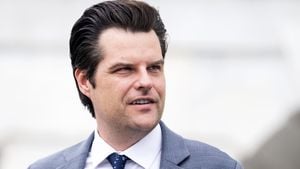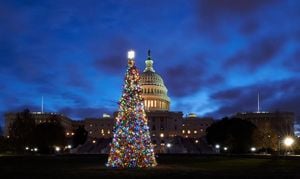The legal battles surrounding Donald Trump reached a significant turning point when federal cases against him were dismissed, marking the end of what many saw as unprecedented legal challenges for a former President. On November 26, 2024, the federal appeals court officially dropped the allegations against Trump related to the mishandling of classified documents. This dismissal follows the Special Counsel Jack Smith's formal request, which played a pivotal role in concluding the legal saga.
After being indicted on multiple charges, Trump’s legal issues stemmed mainly from accusations involving his alleged attempts to overturn the 2020 presidential election result and his handling of classified materials obtained during his presidency. With the dismissal of these federal charges, Trump now looks toward the future, emboldened by the outcome.
Special Counsel Jack Smith had argued for the dismissal based on the Department of Justice's long-standing policy against prosecuting sitting presidents, citing constitutional protections afforded to such officeholders. Judge Tanya Chutkan, presiding over one of the key cases, granted Smith’s request, stating, “The Government has moved to dismiss the Superseding Indictment without prejudice.” This ruling implied the possibility of future charges after Trump steps out of the presidential office.
It’s worth noting the historical significance of these proceedings. Trump was the first former President to face criminal charges, which many believed set dangerous precedents for the country’s legal systems and political norms. The removal of these charges has sparked intense debate about the accountability of political figures and the boundaries of justice.
Trump responded to the dismissal of his cases on his social media platform, Truth Social, calling the prosecutions “empty and lawless” and claiming they were politically motivated. He characterized the events as “a political hijacking” and portrayed himself as the victor against legal odds stacked against him, saying, “I persevered... and WON.”
While the federal charges may have been dismissed, Trump still faces legal challenges on other fronts. Charges including those related to his conduct during the Capitol riot on January 6, 2021, were also dropped but hold the potential to be revisited. Smith’s team has left the door open for re-entry of these cases. Leaders and experts have expressed mixed feelings about the dismissal, with some arguing it undermines judicial integrity, creating the perception of legal impunity for powerful individuals.
Reactions from within Washington highlighted the divisive nature of Trump’s legal challenges. Critics of the dismissal indicated concerns over perceived favoritism, claiming it could send signals about the fragility of the rule of law. Beyond political circles, the American public remains torn over the issue, often viewing it through partisan lenses.
Meanwhile, as Trump prepares to return to office, the consequences of the dismissal and his previous indictments will reverberate through the political arena. The notion of presidential immunity, coupled with the shift of judicial scrutiny following election results, raises questions about future legal accountability for elected officials.
Trump’s legal team emphasized their strategy moving forward, stating they intend to fight vigorously against any future charges and challenges. The legal maze he navigated over the past several months has galvanized his supporters, but simultaneously alienated critics who continuously argue for higher standards of conduct for public servants.
Legal experts caution against the precedence established by these dismissals, arguing they may forever alter the American political and judicial landscapes. The balance of justice and politics hangs on the delicate threads of this historic case, raising questions about the future of political accountability.
What does this mean for Trump as he resumes his campaign activities? It seems clear he will leverage the dismissal of charges as ammunition to rally his base, citing it as evidence of his resilience against what he views as undue persecution. On the other hand, opponents will likely leverage the dropped cases to argue for continued scrutiny and vigilance against any potential overreach by political figures.
Whether Trump can effectively turn his legal woes and subsequent relief from those issues to his advantage as he attempts to reclaim the presidency remains to be seen. The political climate is more tempestuous than ever, and as the 2024 electoral season heats up, the intersection of law and politics will remain center stage.
The dismissals, though favorable for Trump, represent more than just legal victories; they pose fundamental questions about the integrity of the legal process and the responsibilities of those who hold power. For many, this legal outcome signifies not only the culmination of Trump’s recent challenges but lays the groundwork for future political struggles.
With the dust settling, the public and political analysts alike remain on the lookout for the next chapter of Trump’s saga. Each legal triumph or setback could shift the tides of public opinion and political allegiance, making the coming months pivotal as key elements of the story continue to evolve.



